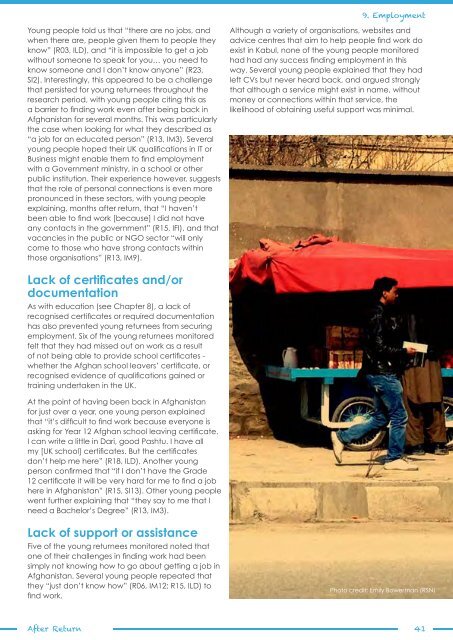After Return
After%20Return_RSN_April%202016
After%20Return_RSN_April%202016
Create successful ePaper yourself
Turn your PDF publications into a flip-book with our unique Google optimized e-Paper software.
9. Employment<br />
Young people told us that “there are no jobs, and<br />
when there are, people given them to people they<br />
know” (R03, ILD), and “it is impossible to get a job<br />
without someone to speak for you… you need to<br />
know someone and I don’t know anyone” (R23,<br />
SI2). Interestingly, this appeared to be a challenge<br />
that persisted for young returnees throughout the<br />
research period, with young people citing this as<br />
a barrier to finding work even after being back in<br />
Afghanistan for several months. This was particularly<br />
the case when looking for what they described as<br />
“a job for an educated person” (R13, IM3). Several<br />
young people hoped their UK qualifications in IT or<br />
Business might enable them to find employment<br />
with a Government ministry, in a school or other<br />
public institution. Their experience however, suggests<br />
that the role of personal connections is even more<br />
pronounced in these sectors, with young people<br />
explaining, months after return, that “I haven’t<br />
been able to find work [because] I did not have<br />
any contacts in the government” (R15, IFI), and that<br />
vacancies in the public or NGO sector “will only<br />
come to those who have strong contacts within<br />
those organisations” (R13, IM9).<br />
Although a variety of organisations, websites and<br />
advice centres that aim to help people find work do<br />
exist in Kabul, none of the young people monitored<br />
had had any success finding employment in this<br />
way. Several young people explained that they had<br />
left CVs but never heard back, and argued strongly<br />
that although a service might exist in name, without<br />
money or connections within that service, the<br />
likelihood of obtaining useful support was minimal.<br />
Lack of certificates and/or<br />
documentation<br />
As with education (see Chapter 8), a lack of<br />
recognised certificates or required documentation<br />
has also prevented young returnees from securing<br />
employment. Six of the young returnees monitored<br />
felt that they had missed out on work as a result<br />
of not being able to provide school certificates -<br />
whether the Afghan school leavers’ certificate, or<br />
recognised evidence of qualifications gained or<br />
training undertaken in the UK.<br />
At the point of having been back in Afghanistan<br />
for just over a year, one young person explained<br />
that “it’s difficult to find work because everyone is<br />
asking for Year 12 Afghan school leaving certificate.<br />
I can write a little in Dari, good Pashtu. I have all<br />
my [UK school] certificates. But the certificates<br />
don’t help me here” (R18, ILD). Another young<br />
person confirmed that “if I don’t have the Grade<br />
12 certificate it will be very hard for me to find a job<br />
here in Afghanistan” (R15, SI13). Other young people<br />
went further explaining that “they say to me that I<br />
need a Bachelor’s Degree” (R13, IM3).<br />
Lack of support or assistance<br />
Five of the young returnees monitored noted that<br />
one of their challenges in finding work had been<br />
simply not knowing how to go about getting a job in<br />
Afghanistan. Several young people repeated that<br />
they “just don’t know how” (R06, IM12; R15, ILD) to<br />
find work.<br />
Photo credit: Emily Bowerman (RSN)<br />
<strong>After</strong> <strong>Return</strong> 41


